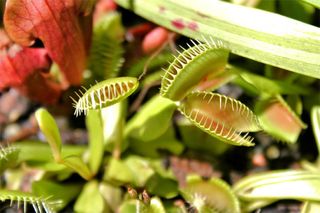Fast-Growing Plants May Carpet World in Green

Take a good look at the world you're used to, because it's going to be pushing up daisies once my newest world domination scheme takes root. In a very literal sense: Using the fruits of some new genetic research, I plan to seed the world with fast-growing grasses and watch as the status quo crumbles under my botanical might.
The research, conducted at Duke University's Institute for Genome Sciences and Policy, has identified a simple genetic switch that allows switchgrass, Miscanthus species and other biofuel crops to grow much faster. Simply by shutting off the gene, researcher can coax the plants to produce thicker roots and quicken their maturation.
And while the Duke University researchers have some environmentally friendly plans for the plants, my plan is downright magnanimous to Mother Earth. Using these quick-growing-grasses, I can turn the world's highways back into grasslands.
Before I get into the specifics of my plot, I should explain how the folks at Duke got these grasses to take root so quickly. When they screened for genes that turn off as roots quit growing, the one gene they found was UPBEAT1, which controls the expression of a class of enzymes called peroxidases. When this gene turns on, the roots switch from proliferation – the uncontrollable need to grow – to differentiation – a tendency to settle down and support the plant.
UPBEAT1 works by regulating free radicals, the same agents of stress that humans try to combat in our own bodies with antioxidants. When UPBEAT1 is turned off, free radicals run wild in the plant root and allow the plant to produce more and larger cells. When UPBEAT1 is increased, the roots grow slower.
The research team hopes that by turning UPBEAT1 off in a population of grasses, they can produce faster-growing plants that can be harvested for biofuel sooner. They also imagine their fast-growing grasses could sequester carbon from the atmosphere in their roots.
But I've got an even greener scheme – because after all, what could be greener than overrunning the world with plants? If I could turn UPBEAT1 off in a wide variety of grasses, then spread them out over America's highways and byways, chances are some of them could take root, crumble up the roads, and destroy our transportation systems. Do the same in cities and the urban jungle will turn into a post-apocalyptic savannah quicker than you can write a novel about it.
Sign up for the Live Science daily newsletter now
Get the world’s most fascinating discoveries delivered straight to your inbox.
And of course, uprooting paved roads and highways is just phase one of my dastardly plot: in phase two I plan to turn off UPBEAT1 in a variety of more fun plants: Venus flytraps and stinging nettle, deadly nightshade, zombie cucumber…with this new root-growing technology, I should be able to breed a green army of plants that can take root around my lair, providing me with a sense of security that no normal plant could ever offer.
Soon enough you'll be able to see my newest scheme play out and you'll know for sure: The grass is greener on this side of the apocalypse.
- More Mad Scientist: How Teens Could Overrun the Earth
- Dancing Robot Has All the Right Moves
- Top 10 Mad Scientists
Mad scientist Eric Schaffer has one index finger on the "fire death ray!" button and his other index finger on the exciting pulse of scientific research. His accounts of diabolical machinations, as well as research breakthroughs, appear regularly on LiveScience.
